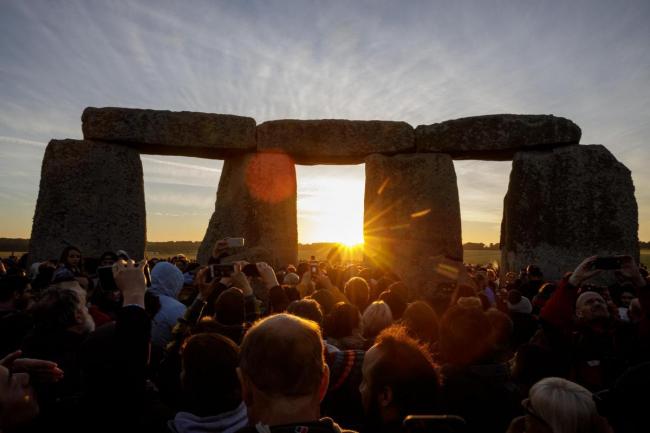
Friday – Summer Solstice
Cultures and civilizations since time immemorial have celebrated the summer solstice, with many magnificent works of architecture (including Stonehenge, the Temple of the Sun at Machu Picchu, the Egyptian pyramids, the Mayans’ Chichen Itza, and Scotland’s Ring of Brodgar) constructed so as to mark the date. Spiritual author Starhawk discusses the significance of the solstice in Spiral Dance:
This is the time of the rose, blossom and thorn, fragrance and blood. Now on this longest day, light triumphs, and yet begins the decline into the dark. The Sun King grown embraces the Queen of Summer in the love that is death because it is so complete that all dissolves into the single song of ecstasy that moves the worlds. So the Lord of Light dies to Himself, and sets sail across the dark seas of time, searching for the isle of light that is rebirth. We turn the Wheel and share his fate, for we have planted the seeds of our own changes and to grow we must accept even the passing of the sun.
Notice “decline into the dark” and “share his fate,” which might seem like an unduly dark way of putting it. Why not just say, “We have plenty of summer days left to bask in” rather than, “The days getting shorter.” The always ironic A. E. Housman indulges certainly takes the Eeyore perspective in “How clear, how lovely bright.”
In the first two stanzas, the poet revels in the sun. All seems possible and he makes bold resolutions. “Today I shall be strong,” he assures us. “No more shall yield to wrong,/ Shall squander life no more.”
At the exact midpoint of the poem, however, he acknowledges that his exuberant feelings and renewal plans will not last. He senses his euphoria has prompted him to overpromise and that he cannot, in fact, retrieve the days he has squandered. With doubts creeping in, he somewhat desperately resolves to “keep the vow/ I never kept before.”
By the final stanza, the once clear and lovely bright sun is “ensanguining” (bloodying) the skies: “How heavily it dies/ Into the west away.” Whatever hopes he had for the future are, like the sun, “not further to be found” but hopelessly underground.
One wants to respond with Andrew Marvell’s concluding lines from “To His Coy Mistress”:
Thus, though we cannot make our sun
Stand still, yet we will make him run.
Or in other words, enjoy the sun to the fullest on the day that it is with us the longest. Not that Housman’s Shropshire lad, who at 20 frets that he only has 50 years left (“Loveliest of Trees”) and at 22 feels his life is over (“When I Was One and Twenty”), will necessarily take the advice.
But the rest of us can, using Housman’s delightful opening stanza to kickstart us. And as for the rest—well, we can borrow from Wordsworth’s Intimations of Immortality and vow, “No more shall grief of mine the season wrong.”
How clear, how lovely bright,
How beautiful to sight
Those beams of morning play;
How heaven laughs out with glee
Where, like a bird set free,
Up from the eastern sea
Soars the delightful day.
To-day I shall be strong,
No more shall yield to wrong,
Shall squander life no more;
Days lost, I know not how,
I shall retrieve them now;
Now I shall keep the vow
I never kept before.
Ensanguining the skies
How heavily it dies
Into the west away;
Past touch and sight and sound
Not further to be found,
How hopeless underground
Falls the remorseful day.

